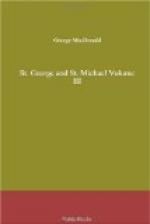‘Come, child,’ said her mistress as she entered, ’I would have thee sing to my lord the song that wandering harper taught thee.’
’Madam, I have learned of no wandering harper: your ladyship means mistress Amanda’s Welsh song! shall I call her?’ said Dorothy, disappointed.
‘I mean thee, and thy song, thou green linnet!’ rejoined lady Margaret. ’What song was it of which I said to thee that the singer deserved, for his very song’s sake, that whereof he made his moan? Whence thou hadst it, from harper or bagpiper, I care not.’
‘Excuse me, madam, but why should I sing that you love not to hear?’
’It is not I would hear it, child, but I would have my lord hear it. I would fain prove to him that there are songs in plain English, as he calls it, that have as little import, even to an English ear, as the plain truth-speaking Irish ditties which he will not understand. I say “Will not,” because our bards tell us that Irish was the language of Adam and Eve while yet in Paradise, and therefore he could by instinct understand it an’ he would, even as the chickens understand their mother-tongue.’
’I will sing it at your desire, madam; but I fear the worse fault will lie in the singing.’
She seated herself at the harpsichord, and sang the following song with much feeling and simplicity. The refrain of the song, if it may be so called, instead of closing each stanza, preluded it.
O fair, O sweet, when I do
look on thee,
In whom all joys so well agree,
Heart and soul do sing in
me.
This you hear
is not my tongue,
Which once said
what I conceived,
For it was of
use bereaved,
With a cruel answer
stung.
No,
though tongue to roof be cleaved,
Fearing
lest he chastis’d be,
Heart
and soul do sing in me.
O fair, O sweet, &c.
Just accord all
music makes:
In thee just accord
excelleth,
Where each part
in such peace dwelleth,
One of other beauty
takes.
Since
then truth to all minds telleth
That
in thee lives harmony,
Heart
and soul do sing in me.
O fair, O sweet, &c.
They that heaven
have known, do say
That whoso that
grace obtaineth
To see what fair
sight there reigneth,
Forced is to sing
alway;
So
then, since that heaven remaineth
In
thy face, I plainly see,
Heart
and soul do sing in me.
O fair, O sweet, &c.
Sweet, think not
I am at ease,
For because my
chief part singeth;
This song from
death’s sorrow springeth,
As to Swan in
last disease;
For
no dumbness nor death bringeth
Stay
to true love’s melody:
Heart
and soul do sing in me.
‘There!’ cried lady Margaret, with a merry laugh. ’What says the English song to my English husband?’




